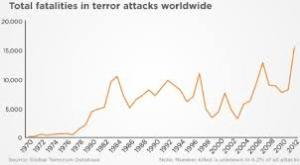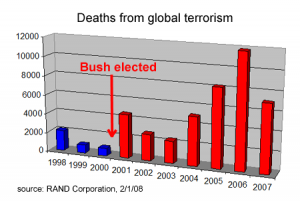Global Terrorism on the Rise
Terrorists killed almost 18,000 people in 2013, an increase of 61 per cent over the year before. In its second Global Terrorism Index, the Economics and Peace Institute says that more that 50 people were killed in each of 24 countries in 2013. More than 80 per cent of those killed died in five countries: Iraq, Afghanistan, Pakistan, Nigeria and Syria. However, terrorist attacks also claimed lives in 55 other countries such as Turkey, Mexico, the United States, the United Kingdom, Greece, Israel, the Czech Republic and Chile. The largest increase in terrorism was in Iraq where fatalities rose 164 per cent to 6,362. ISIS is responsible for most of the deaths in the country.

Four radical Islamic groups dominated terrorism in 2013: ISIS, Boko Haram, al Qa’ida and the Taliban. The Global Terror Index suggests that over the next year, terrorism will grow dramatically in at least 13 countries: Angola, Bangladesh, Burundi, Central African Republic, Cote d’Ivoire, Ethiopia, Iran, Israel, Mali, Mexico, Myanmar, Sri Lanka and Uganda.
The Executive Chairman of the Institute for the Economics and Peace Institute says “Terrorism doesn’t arise on its own.” Steve Killelea says policies can be put in place to eradicate the conditions that lead to terrorism. These essentially involve greater policing and investment in strategies to promote peace. The GTI says three things are linked to terrorism: state-sponsored violence, group grievances, and high levels of crime. The study also showed that, contrary to popular opinion, poverty, low school attendance and other economic factors are not linked to terrorism.
So how does terrorism affect us? Apart from the needless pain, shock and grief of the families and friends of those who die through terrorist acts, fear, anger, disgust and rejection are typical reactions. The desire for vengeance is another. The frustration caused by enhanced airport security measures when taking a flight is yet another. We become more defensive. The accumulative psychological effect of these reactions and emotions wear us down. Regular reports of terrorist attacks in the media add to this emotional fatigue, tend to lessen our faith in humanity, and dim our hopes for the future.
Some try to diminish such effects by ignoring terrorism in the same way they ignore traffic accidents, plane crashes and homicides, in a sense, belittling terrorism. Far more people die in traffic accidents each year in North America and Europe than the combined total of people worldwide who lose their lives to terrorism. Yet we continue to drive undeterred by reports of even spectacular accidents involving multiple casualties. We have the same reaction to plane crashes, continuing to fly regardless.
More people die in homicides than in terrorist attacks, with an individual 40 times more likely to be a victim of homicide than be killed by terrorism. In the UK the odds of death by terrorism compared with homicide is 188 to one. In the United States a person is 64 times more likely to die as a result of homicide than in a terrorist act. Such reports may make us more defensive in certain neighbourhoods, but do not deter us from our daily lives.
What’s the most effective way to deal with terrorism? The Global Terrorism Index says the two most successful strategies for ending terrorist groups since the late 1960s have been policing, or initiating a political process; 80 per cent of organisations that ceased operations ended this way. Only seven per cent of terrorist groups have ended violent attacks as a result of military action.
 This begs the question as to why the United States and its allies have opted for military invasions of such countries as Afghanistan and Iraq. Since the attacks on the World Trade Centre in 2001, the administration of George W. Bush has focused more on military options to drive a War on Terror rather than investing in diplomacy, policing and policies to bring about peaceful change. Despite the withdrawal from Iraq and Afghanistan by US and coalition forces, the administration of President Barack Obama has increased military spending by more than the Bush administration, and drone attacks continue in Yemen and Pakistan. The US has also based drones in Niger to deal with terrorist groups in Africa. Neither administration has placed as much importance on conflict resolution as on a military approach. This is not to say that armed force isn’t necessary. It is merely a call for a more balanced approach.
This begs the question as to why the United States and its allies have opted for military invasions of such countries as Afghanistan and Iraq. Since the attacks on the World Trade Centre in 2001, the administration of George W. Bush has focused more on military options to drive a War on Terror rather than investing in diplomacy, policing and policies to bring about peaceful change. Despite the withdrawal from Iraq and Afghanistan by US and coalition forces, the administration of President Barack Obama has increased military spending by more than the Bush administration, and drone attacks continue in Yemen and Pakistan. The US has also based drones in Niger to deal with terrorist groups in Africa. Neither administration has placed as much importance on conflict resolution as on a military approach. This is not to say that armed force isn’t necessary. It is merely a call for a more balanced approach.
The consideration of military options requires perspective and intelligence. Signals intelligence is certainly not lacking given the array of satellites and western combat jets attacking various ISIS troops in Syria and Iraq. Perspective, however, is sadly lacking given the years of documented success in conflict resolution, education, parliamentary training, establishing the rule of law, and economic development projects in the developing world where commerce and trade have increased substantially.
The Institute for Economics and Peace suggests one way to counter terror is to act against the expanding influence of radical Islamic groups by focusing on more moderate forms of Islam as practiced by Sunni Muslim nations. Mr. Killelea says, however, that given the theological nature of the problem, it is difficult for those outside the Middle East to have much influence in the region. This, however, does not mean it’s impossible, and suggests that support to local Moderate Muslims, governments, and non-governmental organisations will be much more effective over the long term than the current sharp focus on military options.